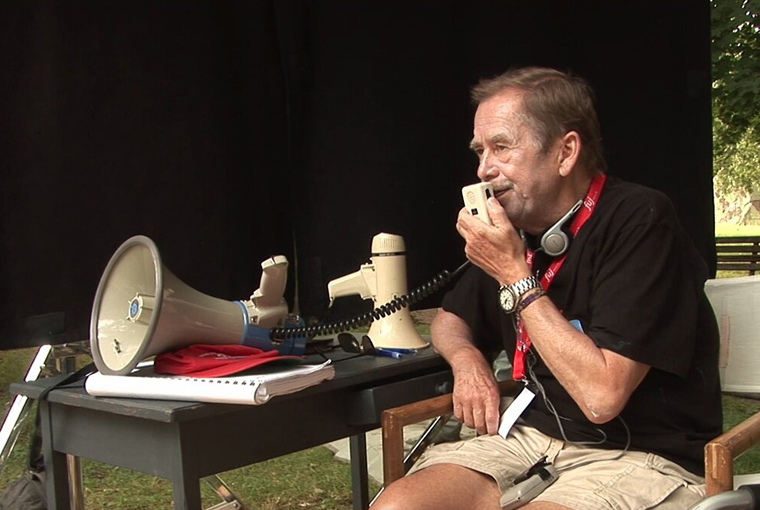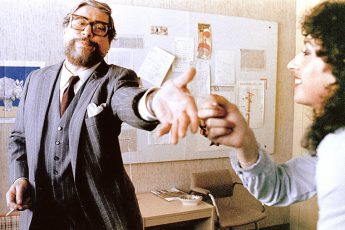The Last Act
Petr Jančárek’s Havel Speaking, Can You Hear Me? (Tady Havel, slyšíte mě?, 2023)
Vol. 142 (February 2024) by Martin Kudláč
If there was a personality in Czech history that is a candidate for having attained the status of secular sainthood, it would undoubtedly be Václav Havel. Havel embodies the essence of a national symbol, a status that invariably complicates any attempt to portray the individual beneath the collective adulation and mythmaking. Czech filmmaker Petr Jančárek takes on the significant task of documenting the final chapter of Havel’s eventful life, aiming to encapsulate his enduring legacy.
Havel Speaking, Can You Hear Me? focuses on the latter years of the former president’s life. Jančárek’s film benefits from unparalleled access to Havel’s private world and his day-to-day life after leaving office – a period during which he remained a prominent figure.
Jančárek’s partnership with Havel began in 2003, reaching a pivotal moment in April 2009 when Havel personally requested Jančárek to document the remainder of his life. Jančárek had previously produced videos for Havel during his presidency and had been chronicling his life in the television trilogy Václav Havel, Praha – Hrad. Their ongoing collaboration was rooted in mutual trust and candor and characterized by a minimalist approach to production.
The partnership benefited from a smooth cooperation with Havel’s office and security detail, alongside Jančárek’s discreet presence throughout the filming process. The director compiled around two hundred hours of exclusive footage, showcasing Havel in various contexts – public appearances, private moments, and international engagements – and capturing his interactions with a wide range of individuals, from global dignitaries to everyday citizens.
The challenge of encapsulating Václav Havel’s legacy is significant, as Czech director Slávek Horák discovered while creating a biographical fiction film about the president in Havel (2020). Such an endeavor inherently grapples with decisions about what details to include or exclude and how to craft a compelling narrative arc. Horák’s film focuses on Havel’s ascent to the presidency, highlighting his tenure as the last president of Czechoslovakia and the first president of the Czech Republic. The biopic delves into Havel’s theatrical pursuits, his hedonistic lifestyle, confrontations with the Communist party, and his political engagements, adopting a storytelling approach that echoes theatrical presentation.
Every adaptation faces its own challenges, particularly the task of distilling someone’s life, or a significant part of it, into a cohesive feature-length narrative. Jančárek, too, encountered such dilemmas in producing his 86-minute documentary from over 200 hours of footage. At the world premiere in Jihlava, he hinted at having additional interesting scenes that were ultimately not included in the film, suggesting that while his documentary celebrates Havel’s life, it also permits a closer examination of the man beyond the public persona, offering a more intimate glimpse into his life that transcends the conventional cult of personality.
The title of Jančárek’s documentary is inspired by an incident on the set of Václav Havel’s film, Leaving (Odcházení, 2011), during which Havel struggled to make himself heard with a megaphone in order to relay instructions to his cast and crew. This event marks a significant moment as Leaving, which symbolizes Havel’s foray into filmmaking, frames the documentary’s narrative. Havel’s passing shortly after the premiere of his cinematic debut lends a poignant context to Jančárek’s work, making the theme of departure a subtle yet constant presence throughout the documentary. Leaving is a play, penned by the ex-president and playwright with a penchant for the absurd and strong autobiographic elements, focusing in particular on the year 2003 when he had stepped down as president. Incorporating elements reminiscent of Shakespeare’s King Lear and Chekhov’s The Cherry Orchard, it mirrors autobiographical aspects of Havel’s post-presidency life.
Jančárek’s documentary intricately follows the journey of Havel as he prepares to direct his first film at 74 – a dream that had been deferred by the constraints of the Communist regime, which led him instead to a career in theater. The documentary captures the script’s revision, the shooting process, and follows the “presidential director” into post-production and the premiere of Leaving. Amidst these cinematic endeavours, Havel is also depicted to be engaging in a variety of responsibilities – meeting with statesmen, delivering lectures, reading his poetry, and accepting lifetime achievement awards, showcasing the multifaceted nature of his very active retirement.
Jančárek captures pivotal moments of Havel’s interactions with notable figures such as the Dalai Lama, Madeleine Albright, and Bill Clinton. A particularly intimate scene unfolds during a casual meeting with Czech director Miloš Forman, during which Havel humorously debates with his wife over whether he can enjoy a small beer, providing a glimpse into his personal life. The documentary continuously explores the dichotomy between Havel’s public and private selves.
Havel describes himself as both an introvert and an extrovert, a theme visualized through scenes of him receiving enthusiastic receptions akin to those of a rockstar, which are contrasted with moments of solitude. These quiet instances reveal Havel engaged in deep thought, marked by shyness, self-doubt, and the contemplation of his own contradictions and vulnerabilities. Throughout these moments, Jančárek maintains a discreet presence, akin to a silent observer, capturing the essence of Havel’s personality.
Given the documentary’s initiation and endorsement by Havel himself, it’s unsurprising that Havel Speaking, Can You Hear Me? steers clear of controversy. Havel’s life, far from mundane, is presented in this film as akin to the concluding chapter of a memoir or entries from a private family album. Jančárek maintains a narrative arc centered on themes of departure, Havel’s being confronted with aging, and the accompanying health problems.
Despite his aversion to aging, Havel continues to exhibit vitality and engagement to the extent that is permitted by his health, even in the face of significant physical setbacks such as a stroke. Mobility aids like crutches or a wheelchair do not deter him from interacting with others and pursuing his activities. Havel’s decision to allow his final years to be candidly documented, including his struggles, falls, and his characteristic self-deprecating humor, demonstrates a form of bravery and candidness. The humor, in particular, acts as a buffer, softening the impact of the more challenging moments captured in what is essentially an audience-driven film.




Leave a Comment